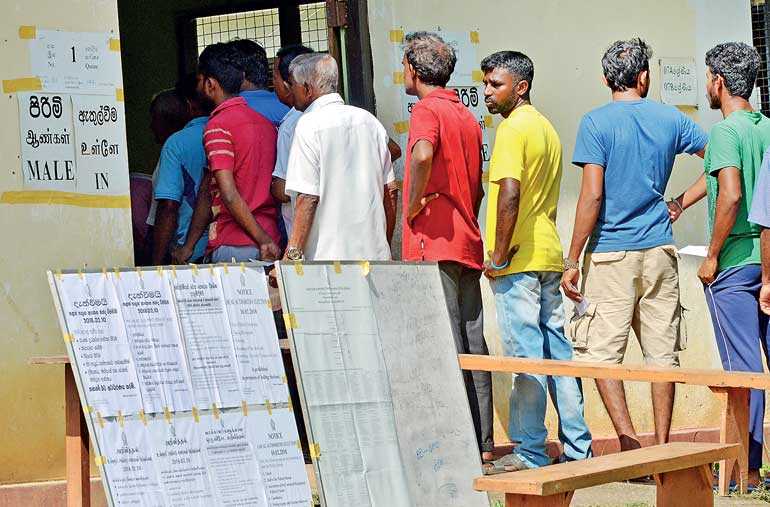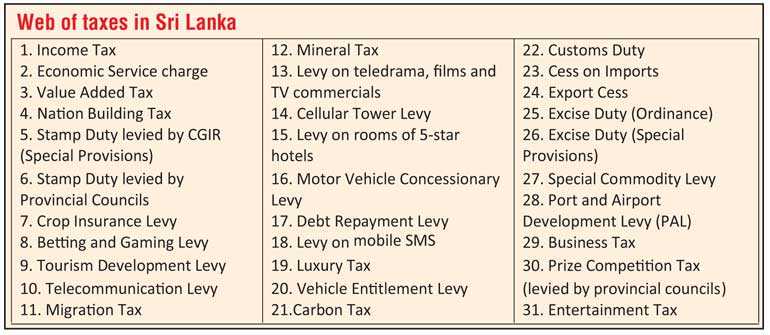Wednesday Feb 18, 2026
Wednesday Feb 18, 2026
Tuesday, 5 March 2019 00:02 - - {{hitsCtrl.values.hits}}

If the Government perceives this year as a ‘year of election’, one should note that the annual budget proposals
in the election years of every country reflect a single trend, i.e. proposals to appease and attract the voters!
– Pic by Shehan Gunasekara
The Budget Speech or the second reading of the Appropriation Bill will take place at 2 p.m. today. As the uncertainty of the elections looms, the content in the Budget 2019 may be the barometer to gauge the Government’s thinking and the level of confidence with regard to executing the contemplated constitutional changes, specifically the 20th Amendment to the Constitution, in which case there would not be a Presidential election towards the end of the year as per the elections calendar.
If the Government perceives this year as a ‘year of election’, one should note that the annual budget proposals in the election years of every country reflect a single trend, i.e. proposals to appease and attract the voters! If this is a year of election one would not expect the trend to be any different in the 72nd annual fiscal budget proposals of Sri Lanka!
Another full fiscal event towards November, ‘The Budget Proposals 2020,’ cannot be ruled out in this context. Today’s Budget is to address the remaining eight months of year 2019, pursuant to the Vote on Account passed on 27 December 2018 to cover the expenditure till April 2019.
Six days have been allotted to debate the Budget proposals presented today and 19 days for the committee stage debate. The crucial second reading division and the third reading division have been scheduled for 12 March and 5 April respectively. As much as today is a significant date in the budget-making process, 12 March and 5 April would also be crucial dates in the process as the “passing of the Budget” or the “voting” takes place on these two dates.
Budget and the tax policy 
There is much room for tax policy makers to formulate a well-thought-out tax policy to suit its economy, to attract much-needed investments as well as boost the industries. In the past, the tax amendments are largely reactive and ad hoc, driven by lobbyists seeking tax reliefs for their respective industry segment and tainted with short-termism as opposed to viewing the best interest of the economy as a whole.
Simplification of the tax system and introduction of appropriate tax policies is the prayer of all stakeholders.
An aerial view of the Sri Lankan tax net reveals that at present there are over 30 taxes, levies and duties in operation collected at various levels (i.e. Inland Revenue Department, Customs and Excise Department, Provincial Councils and Local Authorities). Whilst everybody would accede that the endeavour cannot be an overnight exercise, does the country have a policy in place to simplify it in the long run?
The process of simplifications that commenced in the year 2011 pursuant the Presidential Commission on Taxation seems to have faded away with the passage of time.
The process commenced with abolition of many nuisance taxes [Debit Tax, Social Responsibility Levy (SRL) etc.]. The number of import taxes/levies were reduced to six by the abolition of Regional Infrastructure Levy, Surcharge on Customs Duty and SRL. The table provides a snapshot of the web of direct and indirect taxes applicable in Sri Lanka.
The challenge before the tax policymakers is to consolidate and reduce the number of the above taxes gradually which imposes a great burden on taxpayers and tax administrators in relation to compliance, without harming State revenue. This endeavour requires knowledge, skills and the commitment.
It is apt to mention the following quote by Adam Smith extracted from ‘Wealth of Nations’: “All nations have endeavoured, to the best of their judgment, to render their taxes as equal as they could contrive; as certain, as convenient to the contributor, both in time and in the mode of payment and in proportion to the revenue which they brought to the prince, as little burdensome to the people.”
In order to simplify the income tax regime, the assistance of IMF was sought and a new Inland Revenue Act has been implemented from April 2018. During its 10-month operation, both taxpayers and administrators are grappling with many issues that have stemmed from the change. Transition has been far away from smooth, leading to many grievances, some of which even the tax administrators are not in a position to resolve and the legislator would have to step in by way of introducing amendments to address these legal hiccups. Due to elimination of many exemptions the new Act is expected to enhance the tax base and improve the income tax revenue of the Government.
Policymakers will have to go back to the drawing board in relation to the appropriateness of some of the policies embedded in the new Act. For example, the cry from the exporters who earn much-needed foreign currency to the Sri Lankan economy, with regard to the ‘Predominant Rule’ of 80% to attract the concessionary income tax rate of 14%. Other examples include transitional legal issues, the appropriateness of subjecting a person to income tax in relation to a gain from realisation of a liability where the liability is transferred, satisfied, cancelled, released or expired, and the formula used for taxing some of the employment benefit in the context of the equity in taxation (housing and vehicle benefits).

The inadvertent tax policy of promoting foreign debt as opposed to foreign equity should also draw the attention of the relevant authorities. As the law stands at present the return for foreign debt (interest) is free from withholding tax if invested in government securities, bonds. A policy pronouncement has been made to ensure that all forms foreign debt investments including foreign loans, sovereign bonds to be free from income tax liability in Sri Lanka. However, return on equity is liable to dividends tax at the rate 14% (subject to lower rates in the Double Tax Treaties).
Due to the policy of the Government of not granting tax holidays, the foreign equity providers are further impacted. Due to the Government’s policy of showering tax benefits on foreign debt providers, investors are also are encouraged to route investments by way of debt rather than equity. Whilst Foreign Direct Investments (FDI) in both forms are welcome, the policy preference should be to promote foreign equity as such investors’ partake in the risk of the ventures in the country.
In formulating tax policy, one needs to look at all dimensions. Had the proposal in the Budget Speech 2017 to establish a ‘National Tax Council’ been implemented, it would have paved the way for formulation of appropriate tax policies.
Year on year modifications are introduced to the tax system via budget proposals. Perhaps the most far-reaching proposal was pronounced in the Budget Speech 2017: the establishment of the National Tax Council and the Office of Tax Ombudsman.
Paragraph 504 – Budget speech 2018: “A National Tax Council will be established and the Office of Tax Ombudsman will be created by an Act of Parliament to resolve grievances of taxpayers with the view to increasing taxpayer confidence in the tax system and to avoid litigations.”
The aforesaid proposal even after two years of pronouncement is awaiting implementation. A prudent analyst may appreciate the implementation of the above would have paved the way for stabilisation of the tax system, consistent and effective tax policy making in the long run. The office of the Tax Ombudsman would provide a path for solving the grievances of the tax payers and elimination of their frustration in the short run, whilst improving the taxpayer confidence in the tax system.
Though the establishment of the National Tax Council and the office of the Tax Ombudsman is not the panacea for all the evil inherent in the tax system in Sri Lanka, the said two institutions have the potential to make a significant change in the tax arena in Sri Lanka.
[The writer, LLB, FCMA (UK), CGMA, is an Attorney at Law.]